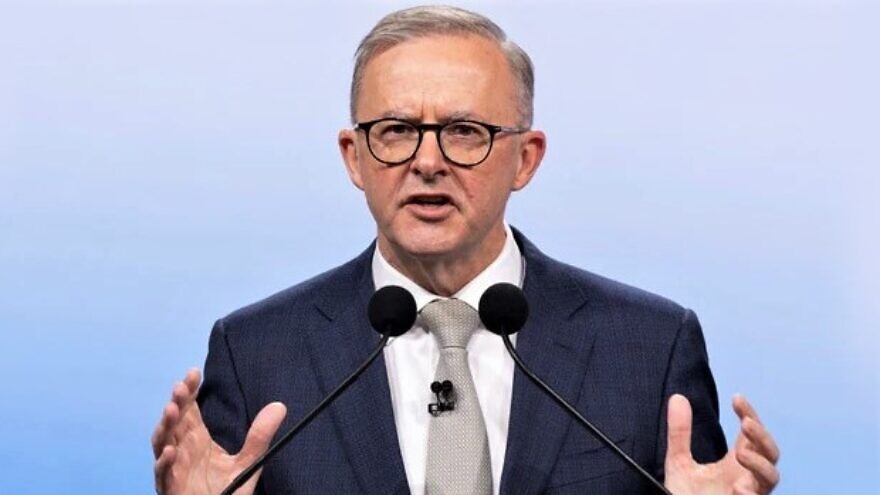When Australia’s new prime minister, Anthony Albanese, won his country’s federal election last month, there was speculation in various media outlets in Australia and abroad over whether he would alter policy with regard to Israel and the Palestinians. As leader of the Australian Labor Party, which promised to recognize a Palestinian state should it win the election, Albanese has been painted as being more sympathetic to the Palestinian cause than his predecessor Scott Morrison, who was vocal in his support for Israel and who backed word with deed, for example by recognizing western Jerusalem as Israel’s capital.
With the center-left Labor government now in charge, ending almost a decade of rule by the conservative Liberal Party and National Party coalition, some fear Israel will be unfairly vilified for defending itself against Palestinian terrorism. Albanese has been accused of making comments that appear to justify those fears. For instance, a 2014 Guardian report stated that Albanese slammed Israel over the “collective punishment” being endured by the people of Gaza, calling it “completely unacceptable.”
Alex Ryvchin, co-CEO of the Executive Council of Australian Jewry (ECAJ), told JNS that while Albanese “has at times criticized Israeli policy and its military operations against Hamas, he has also shown himself to be an ally at critical times.”
Ryvchin noted that in 2011, Albanese “joined with the Jewish community in its successful fight against BDS in the inner-Sydney suburb of Marrickville.”
To reverse long-standing policy which holds Israel to be an important ally of Australia would be a “peculiar departure,” he added.
“While some within the government and the wider party will be agitating for a shift in voting patterns at the United Nations or for morally and legally untenable policies like the unilateral recognition of a Palestinian state, any such moves would side-track the government from its policy priorities and would undermine the government’s credibility,” said Ryvchin.
Arsen Ostrovsky, an Israeli-Australian commentator on Middle East foreign affairs, told JNS that some degree of cooling in the Australia-Israel relationship was likely to be expected because Morrison’s support for the Jewish state had been uncommonly strong.
“There is a quintessential Australian word, ‘mateship,’ which connotes a deep friendship, rooted in loyalty, respect and solidarity. Israel truly could not have asked for a better ‘mate’ or ally than the previous Morrison-led government, which really set the gold standard in support of the Jewish state, both in word and deed. This was evident no more so than at the United Nations and in respect of Israel’s right to self-defense against Palestinian terror groups,” he said.
“Although Israel has been fortunate to have enjoyed relatively strong bipartisan support in Australia over many years,” added Ostrovsky, there could be “a gradual cooling down in the unwavering degree of support we have become accustomed to.”
Emphasizing that the Australian Labor Party “is certainly not Jeremy Corbyn’s Labor Party,” and “while there is solid support for Israel at the top level,” there will “likely be considerable pressure to water this down in the rank and file,” said Ostrovsky.
One of the first tests for the new Albanese-led government, he said, “will be the upcoming Navi Pillay-led U.N. Commission of Inquiry, which is set to shortly release a damning report against Israel. Prime Minister Morrison’s government was unequivocal in standing by Israel in the face of the systematic bias and unfair singling out of Israel at the United Nations. I would hope that Prime Minister Albanese continues this policy.”
Jeremy Jones, director of international and community affairs at Australia/Israel & Jewish Affairs Council, said that for decades, bipartisan support within Australia for good relations with Israel “has been very strong.” Even so, he told JNS the previous government “was widely regarded as being among Israel’s strongest diplomatic allies.”
He noted that concern exists over a number of members of parliament now in government “who have voiced varying levels of hostility to Israel,” but at the same time that “there is a strong and active Parliamentary Friends of Israel group and supporters of Israel in senior government positions.”
He added that a number of strong Israel supporters in the previous government failed to get re-elected, and that “within the pro-Israel community there is concern at the increase in parliamentary representation by The Greens, including some with records of extreme anti-Israel positions, but it is unclear what influence, if any, they will have over foreign policy.”
Ryvchin was hopeful. According to him, “the Jewish community in Australia is diverse, but there is near consensus around support for Israel and opposition to hostile government policy and pronouncements.”
“We look forward to a warm and constructive relationship with Prime Minister Albanese and his government,” he said.


























